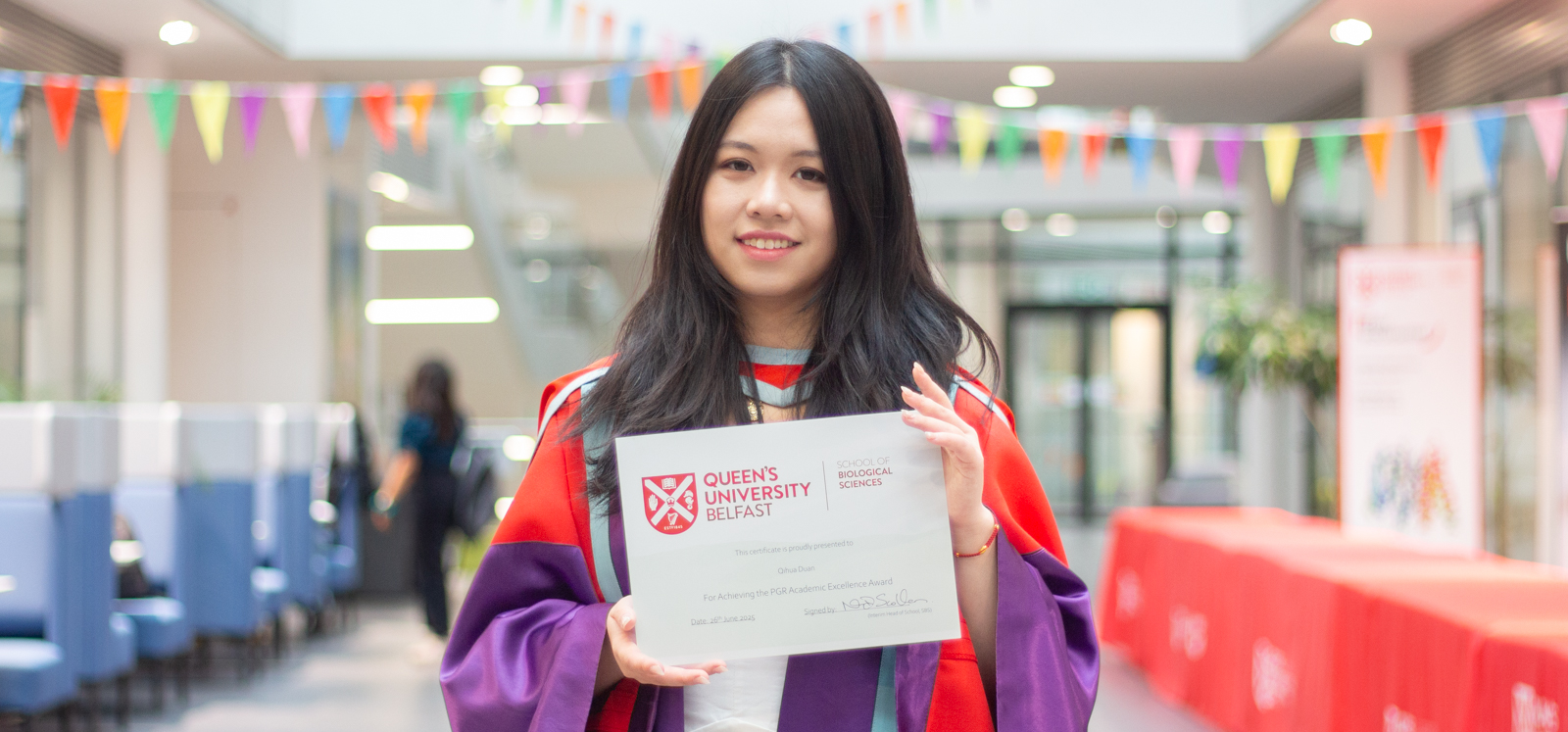PhD Graduate awarded for impressive research into liver disease
Qihua Duan graduates with a PhD from the School of Biological Sciences along with the Postgraduate Research Prize for Academic Excellence.

Qihua graduates from Queen’s University Belfast having been awarded the prestigious Postgraduate Research Prize for Academic Excellence, an honour reserved for one graduating Postgraduate Research Student each year, following her research into the role of non-coding RNAs in the development of metabolic dysfunction-associated steatotic liver disease.
“It’s an incredible honour. The PGR Academic Excellence Prize is not only a recognition of the scientific value of the research, but also of the perseverance behind it. Like most long-term projects, this paper went through countless revisions, technical obstacles, and experiments that didn’t work before it came together. Receiving this award is a deeply meaningful moment in my academic journey, and I’m very grateful to my supervisors, lab mates, and collaborators for their support throughout."
The award recognises the exceptional quality and impact of a first-author research paper published as part of a student's PhD. Qihua’s paper, titled “Elevated miR-34a induced by lipotoxicity and inflammation mediates pathophysiological communication between hepatocytes and hepatic stellate cells in liver fibrosis,” was published in the journal Genes & Diseases.
“Liver fibrosis is a major global health concern and a key predictor of poor prognosis in MASLD patients. However, there are currently no approved anti-fibrotic therapies targeting the molecular mechanisms that drive disease progression.
Our study identified miR-34a as a crucial mediator of hepatocyte-stellate cell communication under metabolic stress, offering a potential therapeutic target. This work not only advances our understanding of RNA-based regulation in liver disease, but also opens the door for future interventions using miRNA inhibitors or delivery systems that disrupt pathogenic signalling in the liver microenvironment.”
The prize was judged by a School panel using the Research Excellence Framework (REF) scoring criteria. In their comments, the judging panel praised the study for identifying a key driver of progressive liver injury and fibrosis in metabolic dysfunction-associated steatotic liver disease (MASLD):
“These findings are highly significant, as they offer novel insights into MASLD pathogenesis and highlight miR-34a as a potential therapeutic target. Given the increased mortality associated with MASLD, understanding its underlying mechanisms, and specifically the role of miR-34a, represents a major step forward and a high-impact contribution to the field.”
Originally drawn to Queen’s by its academic excellence and world-class research, Qihua was especially inspired by the opportunity to work under the supervision of Dr Qiaozhu Su.
“I chose Queen’s University Belfast because of its excellent academic reputation… The opportunity to work under the supervision Dr. Qiaozhu Su, who is internationally recognised in the fields of cardiovascular and metabolic disease, was a major influence in my decision. I was also motivated by the diverse international student community at Queen’s, which made for a truly enriching experience both academically and culturally.
I found the community here to be intellectually vibrant and genuinely welcoming, and I would highly recommend it to anyone considering postgraduate study.”
Throughout her PhD journey, Qihua faced the typical highs and lows of research life, but found strength in the process - from the smallest breakthroughs in the lab to presenting on an international stage.
“My experience at Queen’s has been both challenging and rewarding. Like many PhD students, I faced moments of uncertainty and setbacks in the lab, but I also found immense satisfaction in each scientific breakthrough, no matter how small.
One of my proudest moments was presenting my research at the European Association for the Study of the Liver (EASL) Congress in 2023, where I was selected for an presentation, which was a deeply affirming experience. Additionally, being able to publish my first-author paper on miR-34a-mediated hepatocyte-stellate cell interaction in Genes & Diseases was another highlight that made me appreciate the full arc of the research process—from idea to impact.”
Following graduation Qihua plans to pursue a postdoctoral research position in the field of metabolic disease, with the long-term goal of eventually securing an independent academic position.
Her parting advice?
“Stay curious and don’t be afraid of failure—some of the best ideas are born from unexpected results. It’s also important to build a support network: your supervisors, peers, and mentors can make a huge difference during tough times. And finally, remember to celebrate the small wins—they accumulate into something bigger.”
Media
Media enquiries bio-media@qub.ac.uk
